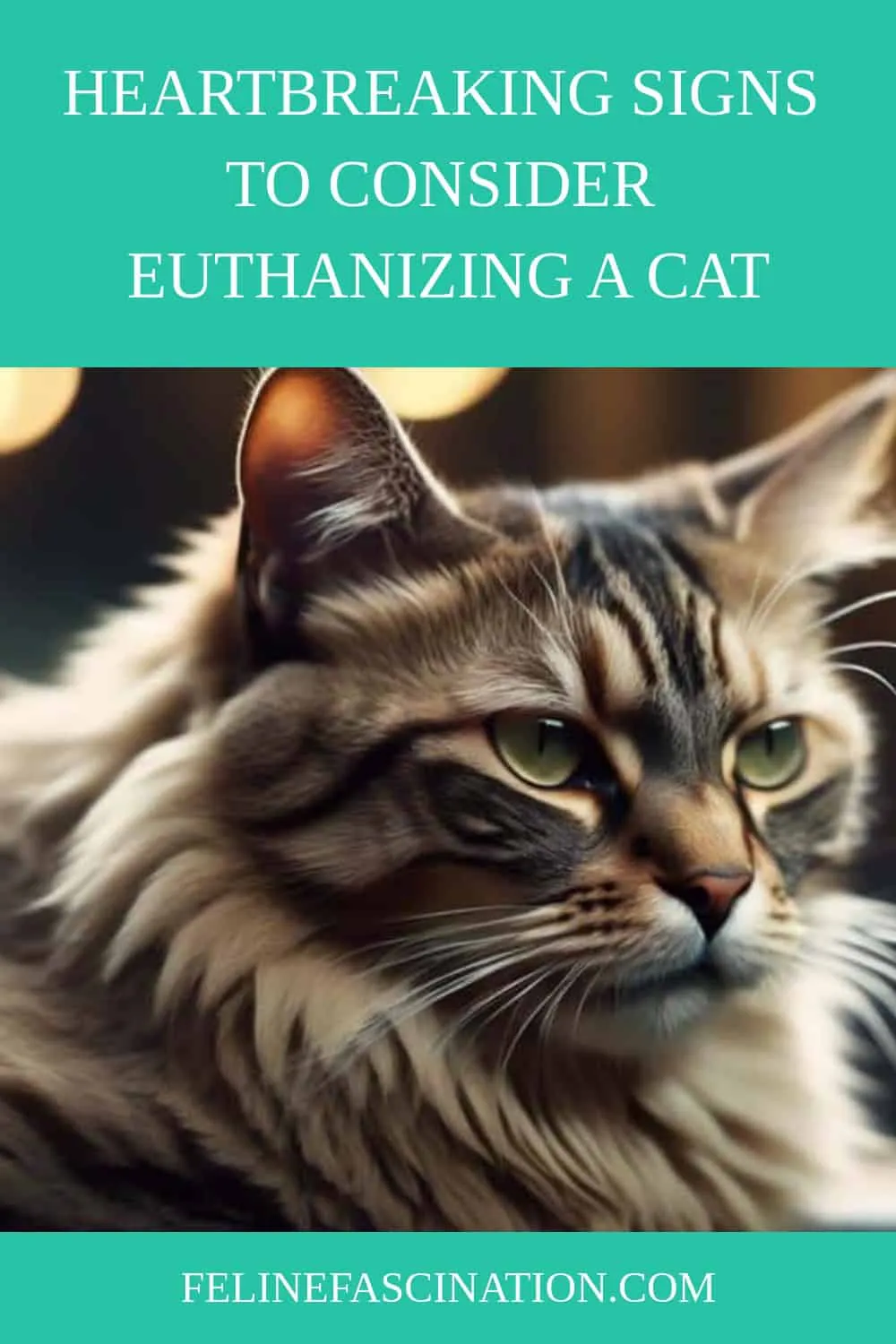The Best Fluffy Pancakes recipe you will fall in love with. Full of tips and tricks to help you make the best pancakes.

When it comes to the well-being of our feline companions, there may come a time when we are faced with an agonizing decision: whether or not to euthanize a cat. This is a decision that weighs heavily on the hearts of pet owners, as it marks the end of a cherished bond and the beginning of a painful grieving process.
However, recognizing the heartbreaking signs that indicate euthanasia may be the most compassionate choice is crucial. In this discussion, we will explore the physical and emotional indicators that may lead one to consider this difficult path.
From the gradual decline in a cat's health to the distressing symptoms that cannot be ignored, we will delve into the delicate balance of making such a decision.
Key Takeaways
- Weight loss and inability to maintain muscle mass, loss of appetite, difficulty breathing, weakness, and persistent vomiting and diarrhea can be signs that it may be time to euthanize a cat with feline leukemia.
- It is important to consult with a veterinarian for a professional opinion and discuss emotional and financial concerns related to euthanasia.
- The decision to euthanize a terminally ill cat should prioritize their well-being and consider the most humane option.
- Seek support from friends and family during this difficult time and consider seeking guidance from other professionals or getting a second opinion if unsure about euthanasia.
Physical Decline and Weight Loss
When considering euthanizing a cat with feline leukemia, one of the signs that may indicate it is time to make that difficult decision is a physical decline and weight loss. Feline leukemia is a devastating disease that can cause a gradual deterioration of the cat's overall health.
As the illness progresses, the cat may experience a loss of appetite and difficulty maintaining muscle mass. This can lead to significant weight loss, which is often accompanied by weakness, lethargy, and a general lack of energy. It is important for pet owners to recognize these signs and consult with a veterinarian to seek treatment options.
However, it is also crucial to consider the emotional and financial concerns involved in caring for a terminally ill cat. Ultimately, the decision to euthanize rests with the pet owner, and seeking support from friends and family during this difficult time can be invaluable.
Loss of Appetite and Refusal to Eat
A common sign to consider when euthanizing a cat with feline leukemia is the loss of appetite and refusal to eat. It can be heartbreaking to witness your beloved cat's lack of interest in food, especially when it is a clear indication of their declining health.
In these difficult moments, it is crucial to seek emotional support to help you navigate through this challenging decision. Turn to friends and family who can provide comfort and understanding during this emotional time.
Additionally, it is important to consult with a veterinarian for guidance and expertise. Veterinarians can offer valuable insights into your cat's condition and help you make the most compassionate decision for their well-being.
Breathing Difficulties and Lethargy
Breathing difficulties and lethargy are often distressing symptoms that may indicate the need to consider euthanasia for a cat with feline leukemia.
Understanding respiratory distress in cats is crucial in making informed decisions about their well-being. Cats with feline leukemia may experience labored breathing, panting, and overall difficulty in breathing. These symptoms can be challenging for both the cat and their owners to witness, as they can be indicative of the cat's declining health.
It is important to consult with a veterinarian to explore treatment options for lethargic cats. Anti-inflammatory medications, antibiotics to address infections, and immune system-boosting supplements may provide relief and improve the cat's quality of life. However, it is essential to have open and honest conversations with the vet about the cat's prognosis and the potential benefits and risks of treatment options.
Ultimately, the decision to consider euthanasia lies with the pet owner, who should seek support from friends and family during this difficult time.
Persistent Vomiting and Diarrhea
Persistent vomiting and diarrhea can be distressing symptoms that require careful consideration when determining the best course of action for a cat with feline leukemia. Cats experiencing gastrointestinal issues need special attention and supportive care to alleviate their discomfort. Here are some important aspects to keep in mind:
- Dietary management for cats with persistent vomiting and diarrhea: Consult with a veterinarian to develop a tailored diet plan that is easy to digest and gentle on the stomach.
- Supportive care options for cats experiencing gastrointestinal issues: Provide hydration through subcutaneous fluids or encourage increased water intake. Probiotics and anti-nausea medications may also be beneficial.
- Monitor the cat's condition closely and consult with the vet regularly for updates and adjustments to the treatment plan.
- Be patient and understanding during this challenging time, offering comfort and reassurance to your beloved feline companion.
- Seek emotional support from friends, family, or support groups to help navigate the emotional toll of caring for a cat with persistent vomiting and diarrhea.
Consulting Professionals and Seeking Support
When faced with the difficult decision of euthanizing a cat, it is essential to consult with veterinary professionals and seek support from trusted sources to navigate this challenging and emotionally charged situation.
Consulting professionals, such as veterinarians, is crucial because they possess the knowledge and experience to provide guidance and advice tailored to your cat's specific condition. They can assess the cat's overall health, discuss treatment options, and help you understand the prognosis. Additionally, veterinary professionals can explain the euthanasia process thoroughly, ensuring that you are fully informed and prepared.
Seeking emotional support is equally important during this time. Friends, family, or support groups can provide a compassionate ear and offer comfort as you grapple with the decision. Their empathy and understanding can help you process your emotions and make a well-informed choice.
Conclusion
In the difficult journey of pet ownership, there may come a time when euthanizing a cat becomes a necessary and compassionate choice. Recognizing the signs of a cat's declining health, such as weight loss, loss of appetite, difficulty breathing, weakness, vomiting, and diarrhea, is crucial for providing them with the best care in their final moments.
It is important to consult with a veterinarian, consider emotional and financial concerns, and seek support from loved ones during this challenging time. Remember, you are not alone in making this difficult decision.
[INTERESTING STATISTIC]: Did you know that approximately 50% of cats over the age of 10 develop cancer at some point in their lives?










